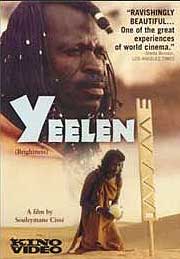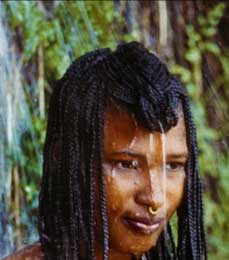 The alleged masterpiece of Souleymane Cisse, one of his country’s foremost filmmakers, 1987’s YEELEN (BRIGHTNESS) has been called the “greatest African film ever made.”
The alleged masterpiece of Souleymane Cisse, one of his country’s foremost filmmakers, 1987’s YEELEN (BRIGHTNESS) has been called the “greatest African film ever made.”
A 13th century set adaptation of an ancient legend from Mali, YEELEN centers on Nianankoro, a young warrior seeking to confront his sorcerer father Soma, who Nianankoro’s mother brands a “terror.” Mother and son have been on the run from Soma’s malevolent influence, which is all-encompassing.
Nianankoro is visited by a spirit that appears in a tree, who warns him, sarcastically, that his journey will be a difficult one—and the spirit isn’t wrong! First Nianankoro is caught trying to steal from a rival tribe and tied up, in which state he’s brought before a makeshift tribunal. He testifies that the only reason he was caught is because he was distracted, and under normal circumstances could have easily killed his persecutors. This leads to a showdown in which Nianankoro and a tribal elder press their heads together.
Nianankoro performs admirably in the showdown, and is asked by Bama, the tribal king, to help them battle the evil spirits afflicting the land. Nianankoro demurs, but agrees to help Bama’s wife Attu, who is unable to bear children. He performs a magic ritual that fails to cure her, to which Bama responds by turning Attu over to Nianankoro and banishing them both from his kingdom.
Yeelen (1987) – Trailer from CINEMAtech Film Series on Vimeo.
Nianankoro and Attu enter a region ruled by Nianankoro’s uncle, who like his father is supernaturally endowed. Here a purifying spring exists in which Nianankoro and Attu ecstatically bathe, after which Nianankoro’s uncle provides him with a magically-endowed paddle for use in facing down his father. Nianankoro sets off for the confrontation, demanding that Attu stay behind; she, however, elects to join him for a supernatural showdown that redefines the term “Scorched Earth.”
 Souleymane Cisse’s filmmaking is pointed and precise, comprised of masterfully ordered wide shots. True, the visuals lack the professional sheen of the Hollywood filmmaking we’ve come to expect, but make up for it in their magisterial use of natural landscapes. Souleymane Cisse clearly knows and understands the African locales on display here, providing a ravishing and seductive piece of filmmaking whose overall effect can be called primitivistic. That goes for the special effects, which are as low rent as can be imagined (with reverse action being the mast elaborate effect), and the music, which is extremely minimal and unobtrusive.
Souleymane Cisse’s filmmaking is pointed and precise, comprised of masterfully ordered wide shots. True, the visuals lack the professional sheen of the Hollywood filmmaking we’ve come to expect, but make up for it in their magisterial use of natural landscapes. Souleymane Cisse clearly knows and understands the African locales on display here, providing a ravishing and seductive piece of filmmaking whose overall effect can be called primitivistic. That goes for the special effects, which are as low rent as can be imagined (with reverse action being the mast elaborate effect), and the music, which is extremely minimal and unobtrusive.
Particularly intriguing is the frank acceptance of supernatural phenomena—a military-style drill designed to test peoples’ instincts in the afterlife is especially novel—in the culturally specific folklore that Cisse never attempts to justify or explain to non-African audiences. This lends the film a unique fascination, as in a sequence in which a woman douses herself with a bowl of what looks like milk as part of some never-explained purifying ritual—an act completely foreign to Western audiences but which seems perfectly in keeping with the film’s staunchly African-centric bent.
The greatest African film ever made? I don’t know about that (my own choice would be FAREWELL JOHNNY), but I will say that YEELEN is a standout example of exotic fantasy from a faraway land.
Vital Statistics
YEELEN (BRIGHTNESS)
Atriascop Paris/Burkina Faso Ministry of Life and Culture
Director/Producer/Screenwriter: Souleymane Cisse
Cinematography: Jean-Noel Ferragut, Jean-Michel Humeau
Editing: Dounamba Coulibaly, Andree Davanture, Jenny Frenck, Nathalie Goepfert, Seipati Keita, Marie-Catherine Miqueau, Seipati N’Xumalo
Cast: Balla Moussa Keita, Issiaka Kane, Soumba Traoure, Issiaka Kane, Aoua Sangare, Niamanto Sanogo, Ismaila Sarr, Youssouf Tenin Cisee, Koke Sangare
